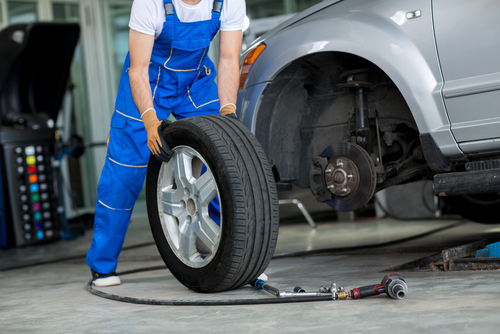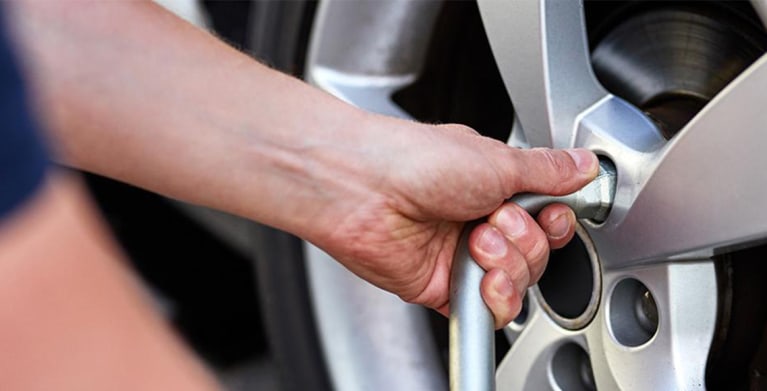Tire Solution: The Influence of Climate Condition
When it involves ensuring optimal performance and safety when traveling, recognizing the impact of climate condition on tire service is critical. From scorching warm to icy roads, each weather aspect can dramatically influence tire functionality and total driving experience. By delving right into the results of differing climate problems on tires, motorists can obtain useful understandings that might enhance their lorry's performance and durability. In this conversation, we will check out the elaborate connection between climate condition and tire service, shedding light on the value of weather-specific tire maintenance methods and factors to consider.
Heat and Tire Efficiency
When revealed to heats, tires experience changes in efficiency that can considerably influence automobile security and handling. The warm generated from extended driving or hot climate problems causes the tire rubber to soften, bring about lowered step life and raised wear. As the rubber ends up being softer, the tire's hold when traveling lessens, affecting braking distances and general grip. In severe situations, extreme warm can even cause tire blowouts, presenting a serious safety and security risk to the vehicle and its passengers.

Cold Climate Results
Cold weather conditions can have a significant influence on tire performance and safety and security. In chilly climate, tires may additionally lose air stress more rapidly, which can impact handling and gas performance.
To minimize the results of cold weather condition on tires, it is critical to consistently check tire pressure and inflate them to the supplier's suggested levels. Using wintertime or all-season tires designed for winter problems can additionally improve grip and grasp on icy or snowy roads. Proper tire upkeep, including regular assessments for wear and damage, becomes even more essential during chillier months to guarantee optimal performance and safety and security.
Rainy Issues Impact
During rainy conditions, tire performance and security can be considerably influenced by the wet roadway surfaces and reduced visibility. The step pattern of tires plays a critical role in maintaining grip on damp roadways. Tires with worn-out treads are more vulnerable to hydroplaning, where a layer of water accumulates in between the tire and the roadway surface area, causing loss of traction. To fight this, motorists must on check these guys out a regular basis check their tires for sufficient tread depth and think about purchasing tires particularly designed for damp problems.
In addition, rainy weather can likewise reduce presence, making it challenging for chauffeurs to see the road in advance clearly (GMC Tire Service). In such conditions, it is important to readjust driving rates appropriately and keep a secure adhering to distance to permit unexpected stops. Appropriately inflated tires can likewise assist in maintaining control on wet roadways by supplying much better handling and grip
Snow and Tire Security
When driving in snowy problems, having the ideal tires can make a substantial distinction in security and performance. Winter months tires are designed with special rubber compounds and step patterns to offer better grip on snow and ice compared to all-season tires.

Additionally, chauffeurs must consider mounting tire chains in extreme snowy conditions. Tire chains offer added traction by grasping the snow and ice, boosting stability and control. Nevertheless, it is essential to follow maker instructions when making use of and installing tire chains to avoid damages to the tires and lorry. By picking the ideal tires, keeping appropriate rising cost of living, and considering their website additional traction help like tire chains, vehicle drivers can enhance their safety and security when navigating snow-covered roads.
Weather-Related Tire Upkeep
Weather-related tire upkeep incorporates a variety of methods intended at making sure optimal tire feature and durability in different weather scenarios. One essential aspect of weather-related tire upkeep is tire pressure law. Evaluating tire tread consistently and changing tires when tread wear gets to a specific deepness is crucial for visit this site maintaining traction and security in damaging climate.
Final Thought
Finally, weather have a significant effect on tire performance and safety. From heat affecting tire stress and wear to cool weather condition decreasing grip, it is necessary to think about the weather condition when maintaining and utilizing tires. Rainy problems can reduce grasp and bring about hydroplaning, while snow can raise the risk of mishaps if tires are not properly equipped. Weather-related tire maintenance is important in guaranteeing optimum efficiency and safety when traveling.
In this discussion, we will certainly explore the detailed connection in between weather condition conditions and tire service, dropping light on the significance of weather-specific tire maintenance techniques and factors to consider.
